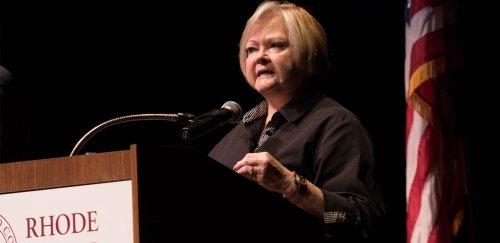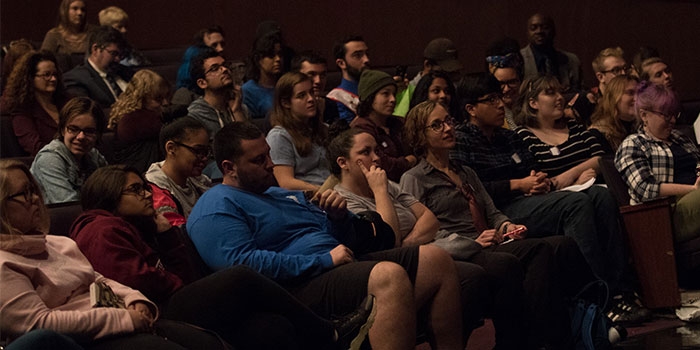“If You Don’t Vote, Nothing Changes,” Said LGBTQ Activist Judy Shepard
- News & Events
- News
- “If You Don’t Vote, Nothing Changes,” Said LGBTQ Activist Judy Shepard

"Hate starts with fear and ignorance of what you don’t understand.” — Judy Shepard
In 1998 Matthew Shepard, a 21-year-old student at the University of Wyoming, was beaten, tortured and left to die on the prairie of Wyoming. His murder was cited as an anti-gay hate crime. That same year, in Jasper, Texas, James Byrd, an African American, was beaten, urinated and defecated on by three white supremacists who then chained him by his ankles to the back of a pick-up and dragged him for three miles until he was decapitated.
Following her son’s murder, Judy Shepard established the Matthew Shepard Foundation, while Byrd’s family created the James Byrd Foundation for Racial Healing. In 2009 President Obama signed the Matthew Shepard and James Byrd, Jr., Hate Crimes Prevention Act, which expanded the act to include crimes committed on the basis of a victim’s actual or perceived gender, sexual orientation, gender identity or disability.
A forum, “Twenty Years Later: A Conversation about the Life and Legacy of Matthew Shepard,” was held at Rhode Island College on Oct. 4, reviewing the ground won by the LGBTQ+ community, how much ground in the last two years the community has lost and where the LGBTQ+ community and its allies go from here.
The forum featured a keynote by Shepard, now a national speaker and LGBTQ activist, followed by a panel discussion. Organized by Pride Alliance, in partnership with the Rhode Island College Division of Student Success and the Division of Community, Equity and Diversity, the event drew hundreds of faculty, staff and students.

During her talk, Shepard, at age 66, epitomized the aphorism “small but mighty.” After 20 years on the frontlines of activism, it was clear that she had seen a lot of battles, all of them uphill, which came through in her delivery – somewhat weary yet resolute, firm and to-the-point and equally unsparing.
Before her son was killed, a movement to expand existing federal hate crime laws, which had been in existence since the civil rights era, was already underway to include additional categories, yet activists who had been trying to add the gay community to the bill had met with years of resistance. Matthew’s murder, awakened the country – the LGBTQ+ community must be added to the list of protected communities.
Two decades later, Shepard said, achieving LGBTQ+ equal civil rights remains an ongoing battle. Under the present administration, “many policies, procedures, even laws in place during the Obama administration have now disappeared.” She said these removals of federal protections and the hate-filled rhetoric of our times are “in direct relation to the election of 2016.”
Shepard’s overriding message – in fact, her imperative – to audience members, and students in particular, was to vote in the upcoming general election.
“If we learn nothing else from our recent election it is that every vote counts,” she said.
RIC Assistant Professor of Gender and Women’s Studies Janice Okoomian, asked Shepard if she could suggest “a way to reverse the despair among students.” (In the last midterm election, only 14 percent of college students participated in the election, according to NASPA President Kevin Kruger.)
“Students feel disaffected from our national culture,” Okoomian said. “They feel that they are not listened to and that those in power do not pay attention to them. This sometimes results in their deciding ‘I’m not going to vote because it won’t make any difference.’”
“You can tell them that if they think one vote doesn’t matter, or one person doesn’t matter, I’m one person. I made a difference. If you don’t vote, nothing will ever change,” Shepard said.
She also warned students to be informed about who they are voting for. Read both sides of every news story, she said, question everything you hear or read by commentators, newscasters and journalists; and be careful about re-Tweeting or Facebooking something you haven’t fact-checked. “Everyone is entitled to their opinion but no one is entitled to their own set of facts,” she said.
Ultimately, “It’s up to you,” she said. “You are not only the present but the future of this country.” She called for students to work toward building a country of equality and opportunity for everyone, “whether you do it through politics or activism, religion or education, the corporate world or the legal world. And you’re getting that opportunity here [at Rhode Island College], because of the things being instituted here that show you what life should be like, which is a life of acceptance of everyone.”
